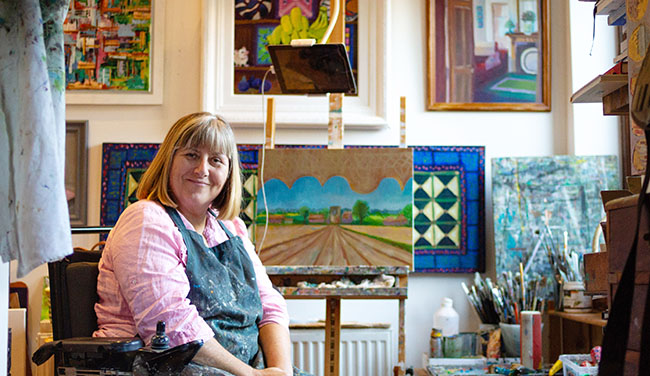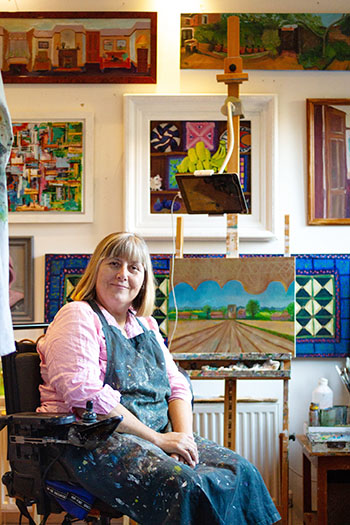 PEOPLE with advanced multiple sclerosis could benefit from new trials aimed at protecting movement in their arms.
PEOPLE with advanced multiple sclerosis could benefit from new trials aimed at protecting movement in their arms.
The new clinical trials – the first ever to include people with multiple sclerosis who have difficulty walking – are set to start in the New Year.
The ChariotMS trial will test whether cladribine tablets (Mavenclad®), already licensed for highly active relapsing MS, can slow the rate of upper limb disability progression in people with advanced MS.
To date, trials for MS have not included people who are reliant on a wheelchair, and drugs have only been licensed if they improve walking ability.
This means there are currently no disease modifying therapies (DMTs) available for the 35-40% of people with MS who need significant help walking.
If successful, ChariotMS could lead to the first MS drug licensed that protects upper limb function.
Professor Klaus Schmierer, from Queen Mary University of London and Barts Health NHS Trust, is leading the trial. He said: “Finding ways to maintain people’s upper limb function is essential to their quality of life, but until now walking ability has been the only official measurement of whether or not an MS treatment is effective.
“This has excluded people who depend on a wheelchair from taking part in trials and, as a result, from accessing effective treatment that will help maintain their hand and arm function.”
There are three main types of MS that are diagnosed – relapsing, primary progressive and secondary progressive. Thanks to research, there are over a dozen licensed DMTs for people with relapsing MS, and two for “active” progressive MS (where new lesions are visible on an MRI). But tens of thousands of people with MS remain without effective treatment.
While cladribine tablets are a highly effective treatment for people with relapsing MS,2,3 early data suggest the drug could also be effective in those with advanced MS.4,5
From January 2021, ChariotMS will recruit 200 people with MS who can walk only a short distance with two crutches, or are unable to walk at all but retain some upper limb function. ChariotMS is also the first trial with no upper age limit.
Dr Emma Gray, assistant director of research at the MS Society, says: “More than 130,000 people live with MS in the UK, and those with more advanced forms can experience difficulty with walking, relying on mobility aids like walking sticks and wheelchairs to help. But as MS progresses, many go on to experience problems with their hand and arm function too – and treatment options start to disappear.
“Preserving hand and arm function would unquestionably improve the quality of life of people with MS, helping them to live more independent lives. That’s why we’re so thrilled to help make this important trial a reality.”
The trial is funded by the Efficacy and Mechanism Evaluation Programme, which is a partnership between the Medical Research Council and National Institute for Health Research, and will receive additional funding from the MS Society, the National MS Society USA, Barts Charity, and Merck Serono.
Professor Danny McAuley, director of the Efficacy and Mechanism Evaluation (EME) Programme – an NIHR and MRC partnership – said: “This landmark study is hugely important and could offer real benefits for patients with advanced MS, who currently have few treatment options.
“This shows NIHR and MRC’s commitment – through the EME Programme – to invest in research evaluating treatments which can potentially make a step change in healthcare.”
- There are 20 ChariotMS trial centres across the UK. People who think they might be eligible should get in touch with their GP about a referral their local centre.
Visit mssociety.org.uk/chariotms for more information.
- To be eligible for the trial, participants need to have an EDSS (Expanded Disability Status Scale) of 6.5 to 8.5 – meaning they can walk no more than 20 meters with two crutches, or are unable to walk at all, but retain some upper limb function.
- Trial sites will include locations in London, Belfast, Birmingham, Brighton & Sussex, Bristol, Cardiff, Edinburgh, Glasgow, Leeds, Liverpool, Luton, Manchester, Plymouth, Sheffield, Swansea, Glasgow.
- Participants will be randomised into a treatment arm and a placebo control arm. The treatment group will receive cladribine tablets (3.5mg/kg over 24 months) and the placebo group will receive ‘dummy’ tablets. Upper limb function will be assessed by the 9-hole peg test (9HPT), which will be used to measure change over time in participants. The 9HPT will be assessed at every visit, i.e. at screening, baseline and then every six months until trial completion.
 JENNY FERGUSON, 63, has secondary progressive MS. She was first diagnosed with the relapsing form of MS in 1994, age 37.
JENNY FERGUSON, 63, has secondary progressive MS. She was first diagnosed with the relapsing form of MS in 1994, age 37.
The former midwife became reliant on a wheelchair around seven years ago, and today her only limb function is in her right arm and hand.
She said: “Only one of my four limbs actually works – my right arm. My left leg and right leg are very heavy and have to be moved for me, and my left side is now virtually redundant. I need help with basic things like getting on and off the toilet, getting dressed and out of bed, and having my food made for me.
“I worry a lot about losing the use of my right hand – having a fall and fracturing it, for instance.
“When MS meant I had to stop working, I started painting to save my sanity, and I’m grateful I can still enjoy that. I think without painting there would be virtually no purpose to my day at all. Your life is only worth living if you’re happy with yourself, and being able to do things and have some independence is key to that.
“I have sometimes felt that people like me, with advanced MS, are not seen as important. Being excluded from treatment and trials, and then being told there is nothing for you is very discouraging.
“If you can’t use your arms you are completely left behind. We deserve to have the same hope as everyone else. Having a treatment that could preserve the use of my hand would make such a tremendous difference to my life – it would be huge.”
About multiple sclerosis
- Over 130,000 people live with multiple sclerosis (MS) in the UK
- MS damages nerves in your body and makes it harder to do everyday things, like walk, talk, eat and think
- It’s relentless, painful, and disabling
- It’s unpredictable and different for everyone
- In relapsing remitting MS (RRMS) people have distinct attacks of symptoms which then fade away completely – this is called a relapse.
- Around 85% of people with multiple sclerosis are diagnosed with RRMS.
- Many people with relapsing MS go on to develop secondary progressive MS, where they have a build-up of symptoms independent of relapses.
- Primary progressive MS (PPMS) affects about 10-15% of people.
- In PPMS symptoms gradually get worse over time, rather than appearing as sudden attacks
MS Society helpline – 0808 800 8000

